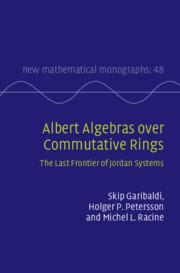Refine search
Actions for selected content:
2 results

Albert Algebras over Commutative Rings
- The Last Frontier of Jordan Systems
-
- Published online:
- 07 November 2024
- Print publication:
- 21 November 2024
CONSTRUCTION OF LIE SUPERALGEBRAS $D(2,1;\alpha)$,\$G(3)$ AND $F(4)$ FROM SOME TRIPLE SYSTEMS
-
- Journal:
- Proceedings of the Edinburgh Mathematical Society / Volume 46 / Issue 1 / February 2003
- Published online by Cambridge University Press:
- 27 January 2003, pp. 87-98
-
- Article
-
- You have access
- Export citation
